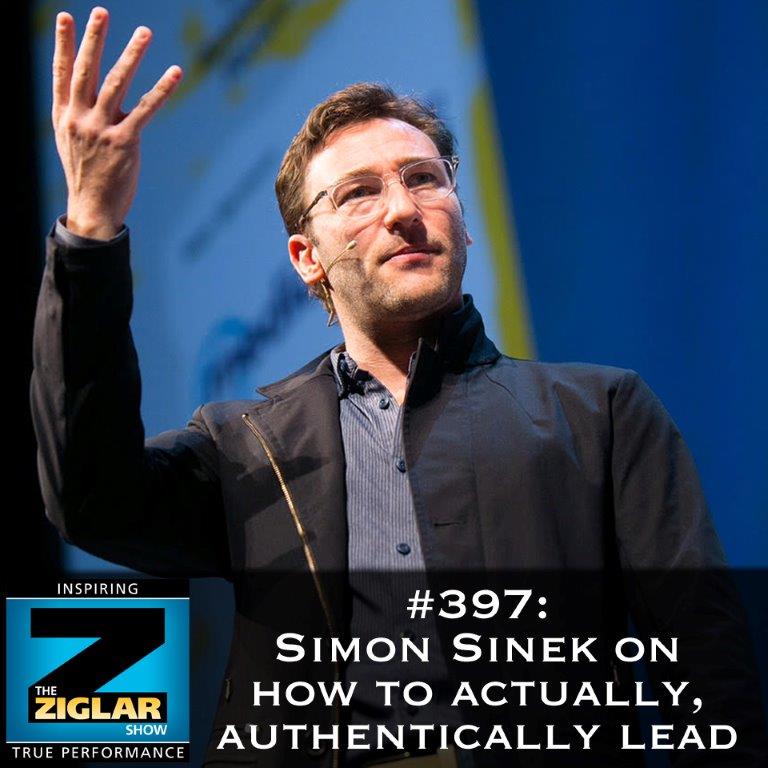
Simon, I’m a huge fan of your book, Start With Why. I was sent a link to your TED talk years ago. Before I got very far into it, I searched for your book and bought it on the spot. In my opinion, it is a must-read for…anyone. I can’t get myself out of bed without knowing my Why, and it must be far greater than and deeper than the day’s basic duties.
I’m so grateful for your work and your effort to get that message out, and I thank you immensely for taking the time to be with us on The Ziglar Show today!
In this show, I want to discuss the message from your book, Leaders Eat Last – Why Some Teams Pull Together and Others Don’t.
The Ziglar audience has many business owners, from large corporations to small businesses to solopreneurs.
But it also has many people who are employees, sales reps, independent contractors and more. I want to talk about how your message is relevant for…everyone. How we can all use the principles to aid our personal success.
First, however, I want some context on YOU and your story.
You got a BA degree in cultural anthropology; Then went to law school; Then left to go into advertising.
You look to have been very successful, ultimately starting your own ad firm.
Next thing, we find you in October 2009 releasing your book Start with Why: How Great Leaders Inspire Everyone to Take Action, and in December 2011 the book topped the list of best-sellers for corporate America.
Then, as of January 2015, your talk How Great Leaders Inspire Action was number three on the list of the twenty most popular TED talks of all time.
Now you look to have fully devoted yourself to inspiring and motivating others. Will you give us a brief understanding of the journey that brought you to where you are today?
>>Listen to the show
Next…you have one of the most-watched TED talks of all time. I see over 26.5 million downloads on the TED site, but the “How Great Leaders Inspire Action” video is on YouTube and elsewhere, and looks to be closer to 30 million downloads overall.
The best content in the world will not get far without…masterful presentation skills. I talk a lot about Zig Ziglar in this light. He was a master presenter. He had some gifting, no doubt. But he was also one of the most fervent students of the craft.
I’ve seen a lot of speakers and presenters in my time. Simon, you are so matter-of-fact in your presentations, so exacting, authentic and engaging, it’s hard not to chalk you off as just…superhuman. I’m not looking to discount that, truthfully. But for our listeners who are striving and often have the propensity to discount themselves and their possible brilliance…tell us. Is your speaking and presenting skill just a full-out natural talent and ability, or…have you worked at it? Maybe just a little bit?!
>>Hear Simon’s responses on the program.
So with your book and message in Leaders Eat Last, there are multiple focal points that directly address different demographics of people. For you, though, I want to know what the core interest was that drove you to this focal point.
The tagline is “Why Some Teams Pull Together and Others Don't,” but the initial description leads off with “finding fulfillment at work.”
Then, at a base level, you seem to have come at this asking what really created trust. Not just at work, but in all relationships, starting in the home as parents.
>>Listen to the show.
What was happening in your work and life when your initial TED talk, “How Great Leaders Inspire Action,” happened? This is where people see an “overnight success,” like you just hopped up onstage and went to overnight fame. What led up to the talk, and how did it alter your trajectory after its success?
>>Hear Simon’s comments on the program.
A foundation of your message here is defining true leadership.
Opening the cover of your book, we are hit with, “Leaders are the ones who run headfirst into the unknown. They rush toward the danger.”
Ok, we could just say they are brave or risk-takers. But then you continue with the crux, “They put their own interests aside to protect us or to pull us into the future. Leaders would sooner sacrifice what is theirs to save what is ours. And they would never sacrifice what is ours to save what is theirs.”
You say this IS the only leadership. Without this type of leadership, we are not truly leaders, we simply have authority. People don’t follow authority. And there are people with no authority, that many will follow, making them leaders.
With this statement, where is your greatest hope? That current people in leadership will change, and start putting their team’s interests ahead of their own? Or that people who already have a heart for this will be inspired by this message and pony up to take the mantle of leadership? I’m sure you want both, but I’m asking, where is your bet on who it will most influence?
>>Listen to Simon Sinek on the show
MOTIVE – something there. To existing leaders who are proudly sitting on the spoils of their position and aren’t super-attracted by the idea of being selfless and sacrificial to their team, then you’re, in essence, saying, Ok, fine, then go forth trying to succeed in your company without the trust and cooperation of your employees; that you’ll have people who may follow the letter of the law, but with no spirit.
So it’s simple math to you. Trust and cooperation or not, just a simple choice and decision, yes?
>>Hear the show.
You talk about “alpha” in regards to leadership. I just don’t think people easily reconcile being the alpha and being a sacrificial leader. The perspective of becoming the alpha is getting to the top by being superior to others, which many people don’t even go after. It feels narcissistic and intimidating and…
Well, many want to lead from a place of influence because they truly DO have others’ interests in mind. But to get to that place of leadership, they need to rise above others.
Help us all reconcile this seeming…dichotomy.
>>What does Simon have to say about that? Listen to the show.
Something significant for us all is your statement of “Trust and cooperation are feelings, not instructions.”
This harkens to a foundational statement from Zig, “You gotta be the right person, you gotta do the right things, in order to have all that life has to offer.”
You’ve got to be the right person.
So if you’re saying no policy, procedure, rule, guideline or designed company culture is going to produce trust and cooperation, if you want that, then you’ve got to be, or hire, a leader with the right character.
In regards to hiring, what’s a viable metric to discern a…what…sacrificial character?
>>Listen to the show
I’m a fan of Dan Buettner’s books on The Blue Zone Diet and Solution where he seeks out the global communities where people live the longest and most vibrantly. While he showcases the specifics of how they live, what they eat and more, he culminates it by stating that if you want to be one of the healthiest, the best solution and what those people most benefit from…is being in a community that fosters the healthy lifestyle.
In Leader’s Eat Last, you cite that safety comes from good leadership, and that good leadership is the tip of the spear for a good community that we feel safe and supported in. The trickle-down effect.
But you’re ultimately putting the foundational value on…the community. If you want a work environment where you feel safe and supported, and you love your work, you must find or create a work community that fosters this. So if you are NOT the alpha, not the leader, then…you’ve got your work cut out for you and may need to look elsewhere.
>>Listen to Simon’s comments on the program
Leadership is not a rank or position. Leadership is a decision and a choice. It has nothing to do with your position in the organization. If you look after others, you have become a leader.
Servant leaders aren’t born, they are made. Our nature, literally physiologically, is to protect ourselves.

